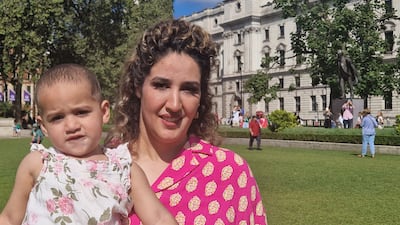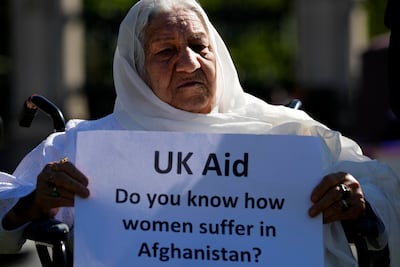Afghans gathered in front of the UK Parliament in central London on Tuesday in a show of solidarity with people in their homeland who have spent the past two years living under the Taliban’s repressive regime.
Protesters held up banners opposing the hardline group’s restrictions on women and one speaker shouted criticism of the “terrorist” rulers of Afghanistan.
Tuesday marks two years since the Taliban seized full control of the landlocked nation and began to roll back years of progressive policies, particularly for women.
Girls over the age of 10 have been banned from schools and women must cover their faces in public.
Sadaf Farzan was among the members of the diaspora who attended the demonstration in Parliament Square.
The mother of two, who moved to Britain in 2012, explained how she finds it heart-breaking to watch women and girls in her country suffer every day.
Wearing a bright pink blouse, a matching shade of lipstick and a fabulous set of false lashes, the 28 year old says she uses her appearance as a form of protest against the regime.

“I put full make-up on today because the Taliban have said that when women get married they are not allowed to put make-up on,” she told The National on Tuesday.
“They have closed salons, they banned education and banned girls from going to each other’s houses for study. It’s so disappointing,” she said, as she cradled her toddler daughter in her arms.
“Every time I think about that it puts me in tears. Why do the girls in my country not have any rights?
"They are being treated very badly. Hopefully the UK is going to do something for girls in Afghanistan.”
'World has a moral duty towards Afghanistan'
Kokogul, 80, sat in a wheelchair and shielded her face from the afternoon sun.
Flanked by younger members of her family, she held a sign that read, ‘UK aid – do you know how women suffer in Afghanistan?’
Born and raised in Afghanistan, Kokogul said she was illiterate because she never went to school.
“It was ordinary for women and girls not to go to school in rural parts of Afghanistan,” she explained. “Afghanistan has always been quite patriarchal towards women."
The grandmother comes from the Ghorband district in the Parwan province, north of Kabul.
She left her homeland as a child and moved to Pakistan, where she was married by the age of 15.
Now settled in Canada, Kokogul said her spirits have been raised by watching her grandchildren pursue the education she was denied.
“Girls should study,” she said decisively.
“Although I didn’t get the chance to do that myself, I believe that every woman and girl should have the right to study.
“A generation of illiterate girls has caused Afghanistan to become such a distraught nation.
“The female population needs to have the right to study, just like my grandchildren now do in the UK and in Canada and other western countries.”

The octogenarian called on Prime Minister Rishi Sunak’s government to step up its aid to her native country.
She said people were at risk of dying from hunger if more financial assistance did not come soon.
Having lost three of her seven children to malnutrition as babies, Kokogul stressed the urgency of the situation.
“People are hungry, people cannot afford food,” she said.
“The world needs to help Afghanistan financially.
“The urgency is humanitarian right now and the world has a moral duty towards Afghanistan.”


